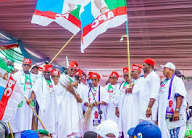Senator Adeola Blames Buhari’s Fiscal Policies for Near Collapse of Nigeria’s Economy
Senator Solomon Olamilekan Adeola, representing Lagos West, has strongly criticized the fiscal policies implemented during the tenure of former President Muhammadu Buhari, asserting that they nearly caused the collapse of Nigeria’s economy.
In a recent statement, Senator Adeola, who is also the Chairman of the Senate Committee on Finance, pointed out the adverse economic effects of Buhari’s administration, particularly the fiscal mismanagement that led to soaring national debt levels and macroeconomic instability.
According to Adeola, the excessive borrowing and lack of coordinated fiscal and monetary policies under Buhari exacerbated Nigeria’s economic challenges, pushing the nation to the brink of disaster.
Under Buhari’s leadership, Nigeria’s national debt ballooned from N12.12 trillion in June 2015 to an alarming N44.7 trillion by the end of 2022.
A significant portion of this debt was attributed to the Central Bank of Nigeria’s (CBN) “Ways and Means” advances, which ballooned to N22.8 trillion during this period.
These massive borrowings and unrestrained spending contributed to a debt-to-GDP ratio that reached 34.7% by the end of Buhari’s presidency, a situation that raised significant concerns about the sustainability of Nigeria’s finances.
Senator Adeola’s remarks reflect the broader criticisms that have been leveled against Buhari’s administration, particularly regarding its economic management. In its assessments, the World Bank noted that inconsistent policies, a declining oil sector, and poor fiscal discipline resulted in a dramatic downturn in Nigeria’s economic performance.
This mismanagement led to a decline in Nigeria’s GDP per capita, which saw significant contraction between 2015 and 2022.
The Senator’s statement comes as Nigeria continues to struggle with the long-lasting effects of the previous administration’s policies. In addition to rising debt, inflation has surged, and the country’s currency has faced significant devaluation.
The Central Bank of Nigeria, under its current leadership, has also attributed the economic hardship faced by Nigerians to the monetary strategies adopted during Buhari’s time in office.
While the Buhari administration’s fiscal policies may have left Nigeria grappling with severe economic difficulties, Senator Adeola has called for swift, decisive action to reverse the damage and restore stability to the country’s economy. With mounting pressure on the current government to address the lingering effects of past policies, Adeola’s remarks signal a need for comprehensive reforms aimed at ensuring a more sustainable and balanced economic future for Nigeria.
As the debate over the Buhari administration’s legacy continues, the challenge of managing Nigeria’s debt and economic recovery remains at the forefront of national discussions.







